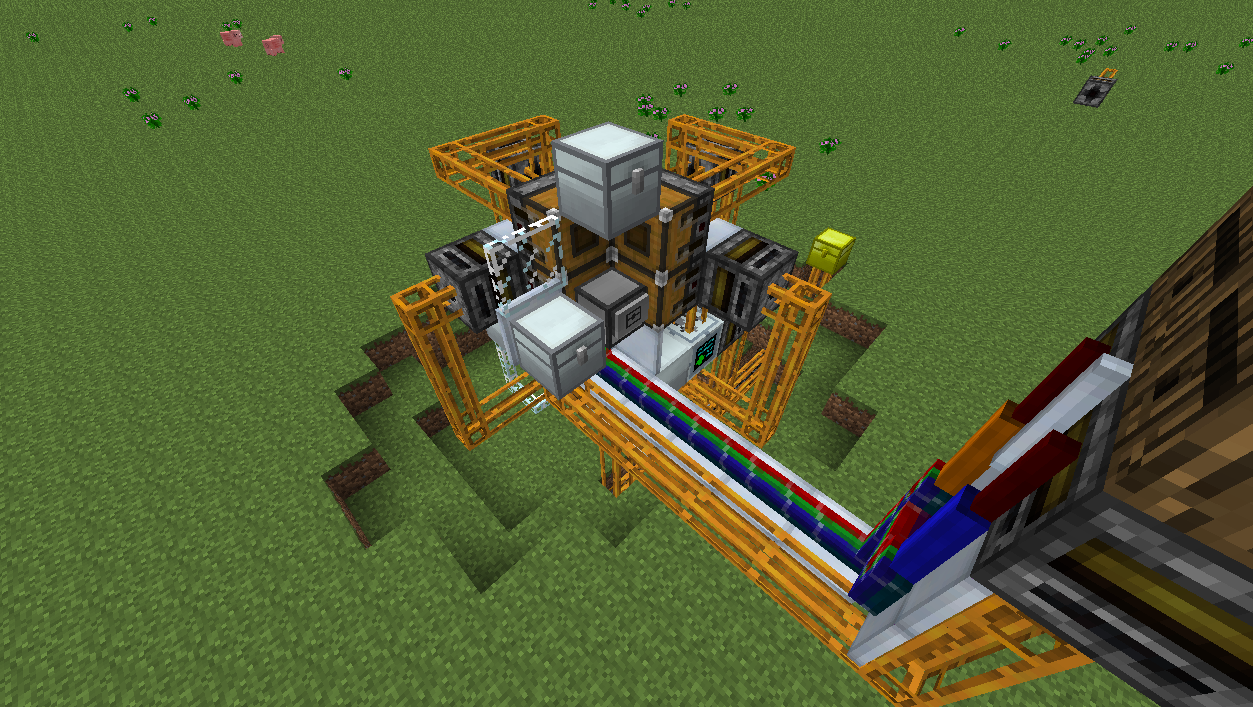Posted 23 February 2013 - 08:16 PM
Title: Lua - Timer events don't seem to be queuing.
I've been working on a relatively simple program which is meant to control the inputted materials to 4 industrial grinders (feed the beast, but largely irrelevant to this question) via a turtle.
Image of my project, for context:

The gist of it is that there are 4 tubes which my turtle must send items down as quick as it can; however, once a tube has been used, it cant be used again for a certain amount of time. To solve this problem, I thought that I would set 4 timers, each representing the 'cooldown time' of the repective tube, so that i could use os.pullEvent("timer") to get the number of the tube that had come free first.
That did not go according to plan - only one timer event would fire. I fiddled around a bit, and didn't find much out; only that for some reason giving the tubes different cooldown times would sometimes allow 2 to fire reliably.
I'm really not sure what to make of it - do the events in the queue have some sort of expiry time or does the queue have a very limited length - I don't even think that makes sense.
I've recently changed my program to simply look continuously through the tubes, and it works fine, but I'd really like to know where I was going wrong.
Any help, or really any more detailed information of timers and the way events are handled, would be greatly appreciated.
Thanks in advance,
Prof. Noobland
I've been working on a relatively simple program which is meant to control the inputted materials to 4 industrial grinders (feed the beast, but largely irrelevant to this question) via a turtle.
Image of my project, for context:

The gist of it is that there are 4 tubes which my turtle must send items down as quick as it can; however, once a tube has been used, it cant be used again for a certain amount of time. To solve this problem, I thought that I would set 4 timers, each representing the 'cooldown time' of the repective tube, so that i could use os.pullEvent("timer") to get the number of the tube that had come free first.
facing = 1
compareSlot = 16
cellSlotStartSlot = 14
cellSlotCount = 2
numMaterialSlots = 2
cellWireColors = {colors.blue, colors.orange}
materialCells = { 1, 2}
tubeEvents = {}
tubeWaitTime = 5
function orientateSelf()
turtle.down()
while turtle.detect() do
turtle.turnRight()
end
turtle.turnLeft()
turtle.turnLeft()
end
function faceTube(tube)
if tube > 2 then
turtle.up()
else
turtle.down()
end
if tube % 2 == 0 then
if facing ~= 2 then
turtle.turnRight()
facing = 2
end
else
if facing ~= 1 then
turtle.turnLeft()
facing = 1
end
end
end
function getNewItems()
turtle.up()
turtle.select( compareSlot )
return turtle.suckUp()
end
function prepareCell( cellInd )
cellSlot = cellSlotStartSlot - 1 + cellInd;
turtle.select(cellSlot)
if turtle.getItemCount(cellSlot) < 1 then
turtle.down()
print("retrieving new cells")
if facing ~= 1 then
turtle.turnLeft()
facing = 1
end
redstone.setBundledOutput("bottom", cellWireColors[ cellInd] )
while not redstone.testBundledInput("bottom", cellWireColors[ cellInd]) do
end
redstone.setBundledOutput("bottom", 0 )
turtle.turnLeft()
while not turtle.suck() do
end
turtle.turnRight()
end
end
function getItemMaterial()
turtle.select( compareSlot )
for i = 1, numMaterialSlots do
if turtle.compareTo(i) then
return i
end
end
end
orientateSelf()
table.insert(tubeEvents, os.startTimer( tubeWaitTime ))
table.insert(tubeEvents, os.startTimer( tubeWaitTime ))
table.insert(tubeEvents, os.startTimer( tubeWaitTime ))
table.insert(tubeEvents, os.startTimer( tubeWaitTime ))
while true do
turtle.select( compareSlot )
if turtle.getItemCount( compareSlot) > 0 then
local mat = getItemMaterial()
prepareCell(materialCells[mat])
local event, param = os.pullEvent("timer")
for i= 1, 4 do
if param == tubeEvents[i] then
print(i)
faceTube(i)
turtle.drop(1)
turtle.select(compareSlot)
turtle.drop(1)
tubeEvents[i] = os.startTimer( tubeWaitTime )
break
end
end
else
print("retrieving new items")
while not getNewItems() do
end
end
end
That did not go according to plan - only one timer event would fire. I fiddled around a bit, and didn't find much out; only that for some reason giving the tubes different cooldown times would sometimes allow 2 to fire reliably.
I'm really not sure what to make of it - do the events in the queue have some sort of expiry time or does the queue have a very limited length - I don't even think that makes sense.
I've recently changed my program to simply look continuously through the tubes, and it works fine, but I'd really like to know where I was going wrong.
Any help, or really any more detailed information of timers and the way events are handled, would be greatly appreciated.
Thanks in advance,
Prof. Noobland


